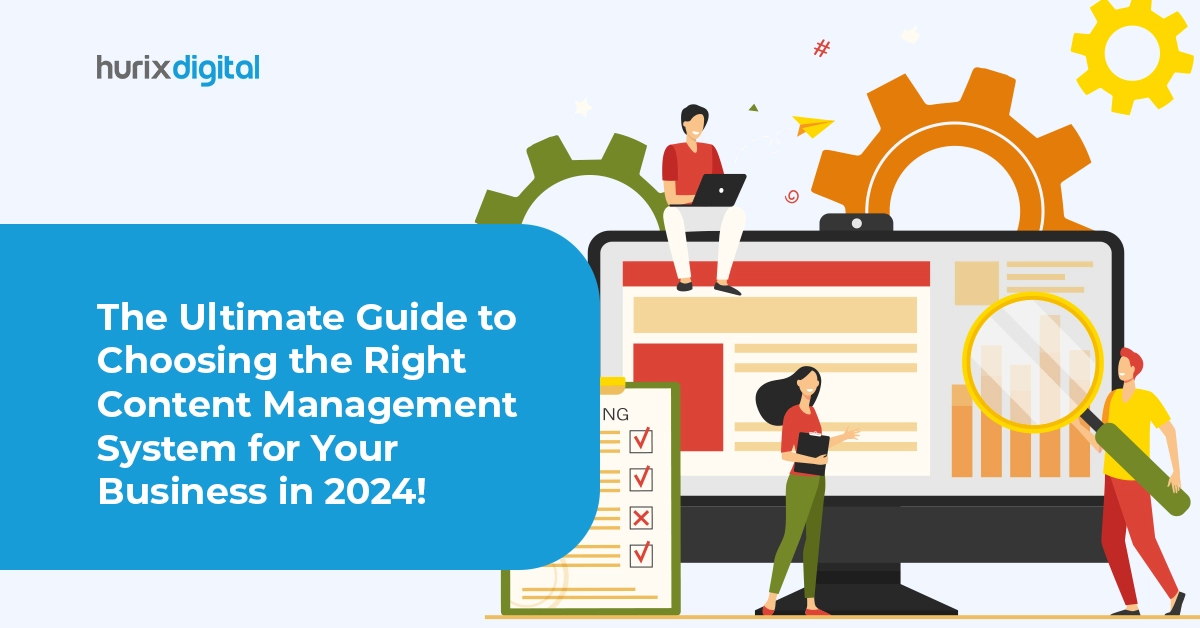Summary
This guide has provided you with a comprehensive understanding of the CMS industry, including the key factors to consider when choosing a CMS solution.
Over the past few years, the concept of a Content Management System (CMS) has evolved significantly in response to the rapidly expanding digital landscape. Initially, a CMS was simply a tool to automate tasks like content uploading, formatting for web pages, and behind-the-scenes SEO improvements.
However, today, the role of a CMS extends far beyond basic content management and publication. With the explosion of digital content, assets, diverse channels, interfaces, and devices, CMS platforms have become essential for businesses navigating the digital realm.
The global CMS market is projected to grow at a CAGR of 6.74% by 2028, reaching a value of USD 28.55 billion. Therefore, businesses must reevaluate their current CMS solutions and opt for more suitable alternatives if their current system no longer meets their needs. Emphasizing an efficient customer experience strategy is key in this decision-making process.
This comprehensive guide dives into the key factors for choosing the right CMS platform, ensuring your choice enhances user experience, integrates seamlessly with CMS hosting, and leverages cloud hosting platforms effectively. This will help you choose a CMS solution that propels your business forward in the digital domain.
Table of Contents:
- Understanding Content Management Systems (CMS)
- CMS Solutions: A Look at the Market Leaders
- Why Choosing the Right Enterprise CMS Matters for Your Business?
- Six Key Features to Look for in a CMS
- Wrapping Up
Understanding Content Management Systems (CMS)
At its core, a CMS is a software application that enables users to create, manage, and modify content on a website without the need for specialized technical knowledge. The right CMS can simplify web design and development, making it accessible for businesses to maintain an online presence with ease.
The user experience of managing and publishing content is as crucial as the experience of the end-users visiting your website. A CMS that offers a clean, intuitive administrative interface reduces the learning curve for your team and streamlines content management processes. This focus on user experience can significantly impact your team’s efficiency and your website’s effectiveness in engaging visitors.
The content management lifecycle comprises five stages:
- Planning: Identify your audience, their needs, and the content that meets those needs.
- Creation: Produce the content outlined in the planning stage.
- Management: Organize and access approved content using a CMS.
- Deployment: Publish content through your CMS.
- Evaluation: Assess the effectiveness of published content.
Also Read: The Future of AEM Mobile Apps: Current Trends and Future Predictions of 2024!
CMS Solutions: A Look at the Market Leaders
Several CMSs have risen to prominence, each with its unique strengths. Let’s take a look at some of them:
- WordPress: This is one of the most widely used CMS platforms globally. Known for its user-friendly interface, extensive plugin ecosystem, and flexibility, WordPress powers millions of websites, ranging from personal blogs to corporate portals and e-commerce stores.
- Joomla: Offering a variety of templates and extensions, Joomla caters to a broad range of websites, including blogs, e-commerce sites, and social networks. Its intuitive interface makes it accessible to users with varying levels of technical expertise.
- Drupal: Known for its scalability and customization capabilities, Drupal is favored among developers for building intricate websites, online communities, and intranet portals. With its extensive array of modules and themes, Drupal offers flexibility for creating tailored digital experiences to meet diverse business needs.
Why Choosing the Right Enterprise CMS Matters for Your Business?
Over 60% of websites rely on a content management system (CMS), highlighting the importance of selecting the appropriate one for online businesses.
Here’s why your CMS choice is critical:
1. Boosted Search Engine Visibility
A quality CMS, especially an enterprise-grade one, can significantly enhance your website’s search engine presence. Features like optimized URL structures, meta descriptions, alt text for images, and XML sitemaps contribute to better rankings on search engines like Google.
2. Improved Collaboration for Productivity
Many marketing teams struggle not with content creation but with effective management. A proficient enterprise CMS streamlines content organization and permissions, allowing global access for contractors and staff. This fosters productivity by simplifying content optimization and publication.
3. Implementation of Information Governance
As online business activities grow, concerns about data breaches, privacy regulations, and industry compliance become more prominent. Enterprise CMS platforms address these concerns with information governance features and customizable permission settings, ensuring agility and security for enterprises.
4. Revealing Dark Data
Integrating content marketing with business intelligence is essential for informed decision-making. Enterprise CMS platforms play a crucial role in uncovering “dark” data, which consists of unused information that doesn’t contribute to business intelligence. Traditional CMS platforms, designed before the era of continuous, omnichannel, personalized experiences, often lack the functionality needed to handle modern content trends.
Six Key Features to Look for in a CMS
The process of outgrowing a CMS is gradual but recognizable. Signs of an aging CMS include requiring excessive IT attention for security and bug fixing, content creators encountering issues with slow load times and cumbersome processes, and difficulties adapting to the demands of an omnichannel marketing environment.
If you’re experiencing these challenges, it’s time to explore a modern enterprise CMS solution that meets the dynamic needs of your organization.
When exploring CMS solutions, prioritize the following features:
- User Experience: A CMS should offer an intuitive interface that enables your team to publish content efficiently. A stellar user experience on the back end translates to productivity and a smoother content management process.
- Flexibility and Scalability: Choose a CMS that can grow with your business. It should be adaptable to changing web design and development trends and scalable to accommodate increasing content and traffic volumes.
- Security: Opt for a CMS with robust security features to protect your website from cyber threats. Regular updates and strong community support are indicators of a secure CMS.
- CMS Hosting Options: Whether it’s on-premise or cloud hosting platforms, your CMS should offer reliable hosting solutions. Cloud hosting platforms are increasingly popular for their scalability, security, and performance benefits.
- Integration Capabilities: Your CMS should seamlessly integrate with other tools and systems, such as CRM software, social media platforms, and analytics tools, to create a cohesive digital ecosystem.
- SEO Features: Built-in SEO tools are essential for improving your website’s visibility. Look for features like customizable URL structures, meta tags editing, and integration with Google Analytics.
Lastly, look for platforms that are actively developed, with a clear roadmap for new features and improvements. Consider the trends in web design and development, such as AI-driven personalization and voice search optimization, and ensure your chosen CMS can adapt to these future trends.
Also Read: How to Use Hybrid Apps to Improve Customer Engagement and Loyalty?
Wrapping Up
As we move forward into 2024, the digital landscape will continue to evolve, making it more critical than ever to choose a robust, flexible CMS capable of adapting to new technologies and user expectations. In such cases, it’s essential to consider partners who specialize in delivering comprehensive content management solutions tailored to the diverse needs of businesses.
Hurix Digital offers a suite of services designed to empower businesses of all sizes with cutting-edge CMS solutions. Contact us today to elevate your digital presence and ensure a forward-thinking content management strategy!







